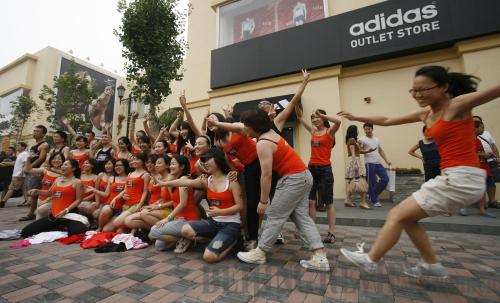|
 |
|
TAKING OFF TOXIC CLOTHES: Activists take part in a choreographed striptease outside an Adidas outlet store in Beijing on July 23, 2011 (COURTESY OF GREENPEACE) |
A group of top international apparel and footwear brands have reported progress toward ending the discharge of hazardous chemicals from their supply chains in China.
On July 30, Adidas, C&A, H&M, Li-Ning, Nike and Puma jointly released an online report outlining their progress and accomplishments in the second quarter of this year on their project The Roadmap to Zero Discharge of Hazardous Chemicals (ZDHC), which began in November 2011.
Early this year, G-Star and Levi Strauss & Co. joined the group in vowing to eliminate all hazardous emissions from its supply chains by 2020.
The whole story started in July 2011, when Greenpeace, an international NGO committed to environmental protection, discovered a Chinese conglomerate, which supplies Nike, Adidas, Puma and other leading brands, had discharged hormone-disrupting chemicals and other toxins into the country's major waterways.
Its findings are based on a yearlong investigation, in which wastewater samples were collected from factory discharge pipes and sent for analysis in laboratories at Exeter University in the United Kingdom and the Netherlands. Samples from two major plants were verified to contain a range of persistent pollutants.
"China is the world's largest textile manufacturer," Yong Rong, head of the Policy and Public Affairs Unit of Greenpeace Beijing Office, told Beijing Review. "If the major textile groups are all involved in the hazardous chemical discharge, the whole situation must be very severe."
The research findings provide a snapshot of the kinds of toxic chemicals that are being released by the textile industry into waterways all over the world, and are indicative of a much wider problem that is having serious and far-reaching consequences for people and wildlife.
On July 13, 2011, Greenpeace released a 115-page report titled Dirty Laundry, which details its yearlong investigation into two Chinese factories—the Youngor Textile Complex and Well Dyeing Factory, based in southern Guangdong and east Zhejiang provinces respectively.
The Youngor facility, for example, is one of China's leading integrated textile firms and boasts some of the country's most advanced technology for dyeing, weaving and printing. However, it was found to have discharged nonylphenol, an endocrine disruptor, which can have an adverse effect on the liver and sperm count.
Greenpeace said that Nike, Adidas, Puma, H&M and Lacoste had confirmed a business relationship with Youngor though all denied making use of the plant's wet processes, which are likely to be responsible for pollution discharges.
The Greenpeace report also mentions several major consumer brands and retailers with business connections with the factories. The companies became the main targets of the organization's zero-toxic discharge campaign.
"We're calling you out because when it comes to sportswear, you're the front-runners, the top dogs, the pace-setters; you have the greatest impact on the supply chain," says the report. "We think you can take this race to a whole different place, and team-up with your suppliers to eliminate all toxic chemicals from your supply chain and products."
Yong called on the foreign firms to insist on higher standards throughout their supply chains. "They have a moral obligation to phase out hazardous chemicals not just in the final product sold to first-world consumers but also in the industrial processes that affect workers and environment in developing nations," she said.
"These companies are doing business with a polluter. We are not accusing them of being evil, but we are challenging them to take the lead in eliminating toxins," Li Yifang, Senior Campaigner of Greenpeace Beijing Office, said. "These chemicals were detected in small quantities, but they are hard to break down so in nature they tend to accumulate to dangerous levels."
| 